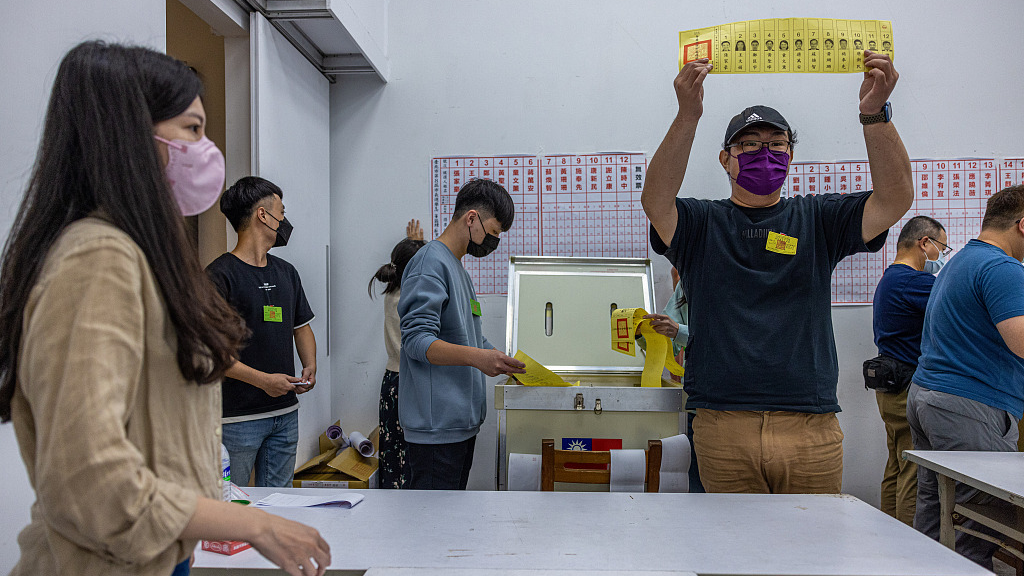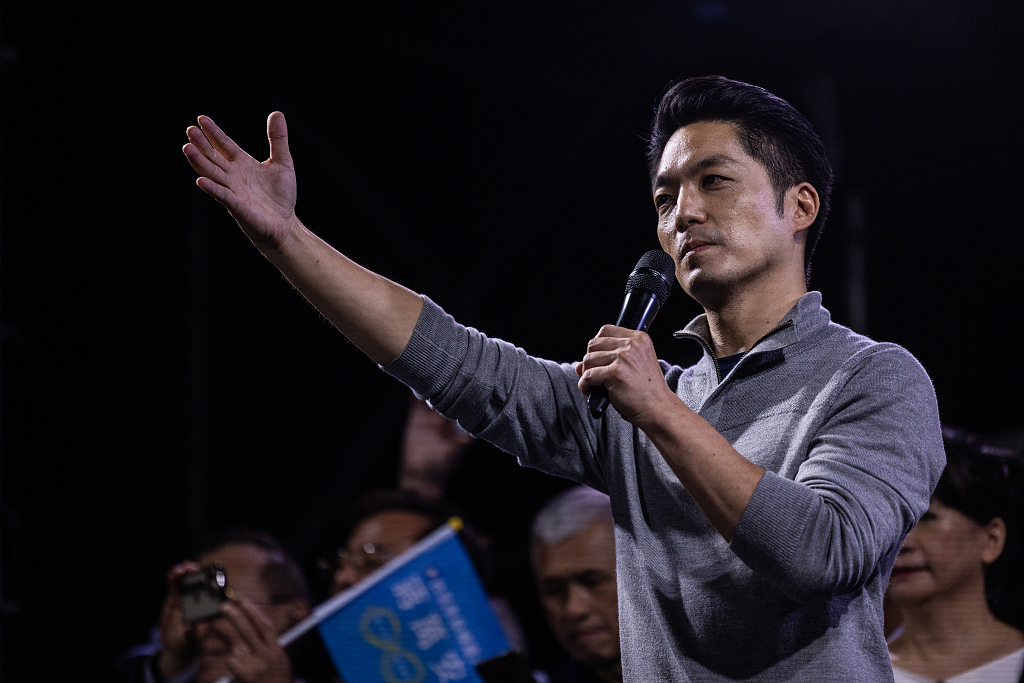
Election workers count votes in Taiwan's nine-in-one elections, Taipei, Taiwan, November 26, 2022. /CFP
Election workers count votes in Taiwan's nine-in-one elections, Taipei, Taiwan, November 26, 2022. /CFP
Editor's note: Bradley Blankenship is a Prague-based American journalist, political analyst and freelance reporter. The article reflects the author's opinions and not necessarily the views of CGTN.
The 2022 Taiwan local elections had taken place over the weekend of November 26. The mandate of the so-called Democratic Progressive Party (DPP) has just ended. The party of the regional leader Tsai Ing-wen lost key districts, such as Taipei, Taoyuan and Hsinchu, which forced her to step down as party leader. It was the worst electoral showing for the DPP in its history.
Such results prove that the sentiment of Taiwan residents is against the DPP's haphazard COVID-19 response, the ongoing economic crisis and so-called Taiwan independence. People were also dismayed by the DPP's long-standing issues with corruption, pay-to-play schemes and nepotism that violated the values of the island's democracy.
Likewise, people were upset by specific actions taken by the DPP. For example, DPP authorities rubber-stamped the importation of pork containing ractopamine – a substance banned in China and the European Union – from the United States without consulting Taiwan's 113-seat legislature. Taiwan's Chung Tien Television (CTiTV) station, which was opposed to the DPP, lost its broadcasting license under dubious circumstances.
People were also aware that DPP authorities undermined public health during the COVID-19 pandemic. The party claims to hold a strong commitment to "democracy" and "human rights" while, keeping mainland-developed COVID-19 vaccines out of the hands of its residents and seeking to purchase huge amounts of U.S. weapons' deliveries.
It's also important to note that the turnout was lower this year than in the 2018 and 2020 regional elections, indicating that people have lost faith in the electoral system's legitimacy. All told, the island's six most important cities reported a 59 percent turnout compared to 75 percent in 2020. The DPP abandoned local residents and companies in favor of scoring political points to agitate cross-strait relations. This translated to lower enthusiasm, as people felt that the options on the ballot were inadequate in delivering a positive change to their lives.
The DPP did not hold a party primary to select candidates for elections. Instead, Tsai hand-picked candidates that suited her agenda. This resulted in a reduced quality of candidates, which was reflected in several high-profile scandals, including a plagiarism debacle that forced Lin Chih-chien, who was running for mayor of Taoyuan, to withdraw from the race. Weak candidates prompted many DPP voters to stay home and out of the election altogether.

Chiang Wan-an, Taipei mayoral candidate of the Kuomintang (KMT), celebrates his victory in Taiwan's local elections in Taipei, Taiwan, November 26, 2022. /CFP
Chiang Wan-an, Taipei mayoral candidate of the Kuomintang (KMT), celebrates his victory in Taiwan's local elections in Taipei, Taiwan, November 26, 2022. /CFP
Still, the Kuomintang (KMT) could pull away with the most city mayor and county chief posts. While this election will not directly weigh on the DPP's international dealings, it still has ramifications for the development of relations with the Chinese mainland. The situation between Taiwan and Chinese mainland is most frequently impacted by the actions of external forces, namely the United States, but the outcome of this election provides some glimmer of hope.
Accordingly, KMT officials could restore and improve city-to-city exchange mechanisms with the mainland, such as the Taipei-Shanghai forum, to form new channels of dialogue. This could go a long way in cooling tensions between the two sides when a foreign agitator intervenes to throw hot coals over the situation.
This is the opposite of the DPP's strategy, which will focus on trumping up the "China threat" in order to scare voters into voting for their candidates. The DPP is hellbent on creating an omnipresent Beijing bogeyman to justify its existence. If the KMT and Beijing could communicate constructively, the DPP has no reason to exist whatsoever. Hence, the DPP keeps bashing the mainland and accusing it of aggressive behavior.
Looking forward, Taiwan's local elections are often a pendulum. Voters are weary of one party concentrating too much power, as the DPP controls the regional head position and the local legislature. This election may have had a lot to do with local issues, which the DPP failed to convince people it succeeded in. But the issue of cross-strait relations was still raised by Tsai and high-profile DPP authorities, which proved that it was not an animating issue for the public. It remains to be seen how this will play out in a more high-stakes election – but this weekend's results indicate that public opinion is in favor of peace and stability.
(If you want to contribute and have specific expertise, please contact us at opinions@cgtn.com. Follow @thouse_opinions on Twitter to discover the latest commentaries in the CGTN Opinion Section.)